Google announced that it has been rolling out a new update called Bert.
I know what you are thinking… does this update really matter? Should I even spend time learning about it?
Well, Bert will affect 1 in 10 search queries.
To give you an idea of how big of an update this is, it’s
the biggest update since Google released RankBrain.
In other words, there is a really good chance that this impacts your site. And if it doesn’t, as your traffic grows, it will eventually affect your site.
But before we go into how this update affects SEOs and what you need to adjust (I will go into that later in this post), let’s first get into what this update is all about.
So, what is Bert?
Bert stands for Bidirectional Encoder Representations from
Transformers.
You are probably wondering, what the heck does that mean, right?
Google, in essence, has adjusted its algorithm to better understand natural language processing.
Just think of it this way: you could put a flight number into Google and they typically show you the flight status. Or a calculator may come up when you type in a math equation. Or if you put a stock symbol in, you’ll get a stock chart.
Or even a simpler example is: you can start typing into Google and its autocomplete feature can figure out what you are searching for before you even finishing typing it in.
But Google has already had all of that figured out before
Bert. So let’s look at some examples of Bert in action.
Is Bert even useful?
Here are 4 examples
of Bert.
Let’s say you search for “2019 brazil traveler to usa need
visa”.
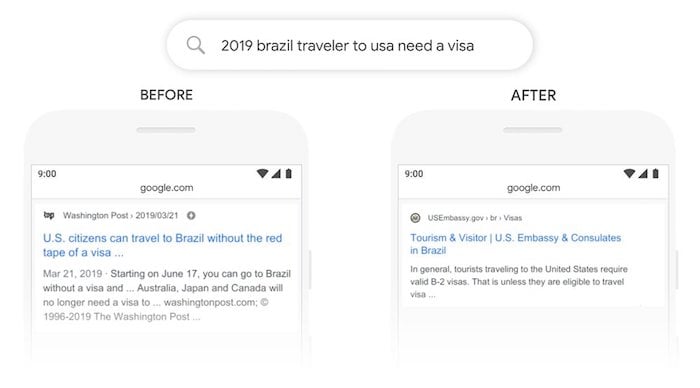
Before Bert, the top result would be how US citizens can travel to Brazil without a visa. But look at the search query carefully… it’s slight, but it is a big difference.
The search wasn’t about US people going to Brazil, it was
about people from Brazil traveling to the US.
The result after the Bert update is much more relevant.
Google is now taking into account prepositions like “for” or
“to” that can have a lot of meanings to the search query.
Here’s another example… “do estheticians stand a lot at work”…
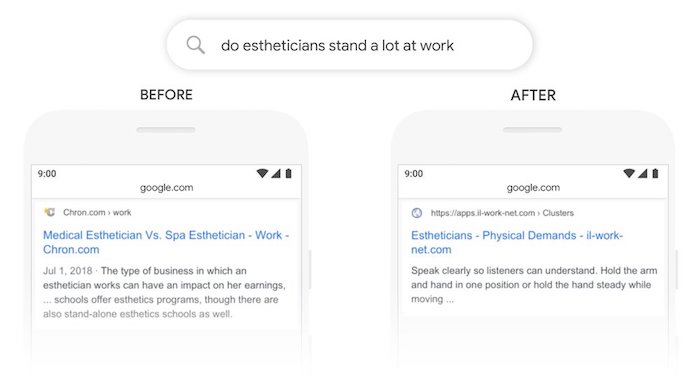
Google used to previously match terms. For example, their
system used to think “stand” is the same as “stand-alone”.
Now they understand that the word “stand” has the context of physical demand. In other words, is the job exhausting… do you have to be on your feet a lot?
And one more, “can you get medicine for someone pharmacy” …

As you can see from the before and after picture, it’s clear
that the new result is more relevant.
Same with this one on “math practice books for adults” …

Is that the only change?
It isn’t. Google also made changes to featured snippets.
For example, if you searched for “parking on a hill with no
curb”, Google used to place too much emphasis on the word “curb” and not enough
emphasis on the word “no”.
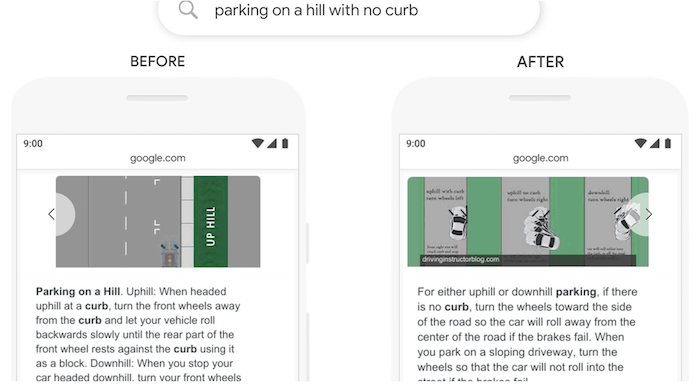
That’s a big difference… and you can see that in the
results.
The new changes this algorithm update brings makes it much more relevant for searchers and it creates a better experience for you and me and everyone else who uses Google.
But how does it affect SEOs?
You need to change your SEO strategy
There are three types of queries people usually make when
performing a search:
- Informational
- Navigational
- Transactional
An informational query is like someone looking to lose
weight. They aren’t sure how so they may search for “how to lose weight”.
And once they perform the search, they may find a solution such as different diets. From there they may search for a solution, using a navigational query such as “Atkins diet”.
Once someone figures out the exact solution, they then may perform a transactional search query, such as “the Atkins diet cookbook”.
From what we are seeing on our end is that Bert is mainly impacting top-of-the-funnel keywords, which are informational related keywords.
Now if you want to not only maintain your rankings but gobble up some of the rankings of your competition, a simple solution is to get very specific with your content.
Typically, when you create content, which is the easiest way
to rank for informational related keywords, SEOs tell you to create super long
content.
Yes, you may see that a lot of longer-form content ranks well on Google, but their algorithm doesn’t focus on word count, it focuses on quality.

The context of the tweet from Danny Sullivan, who is Google’s search liaison, is that he wants SEOs to focus on creating content that is fundamentally great, unique, useful, and compelling.
So when you use tools like Ubersuggest to find new topics to go after, you need to make sure your content is super-specific.
For example, if you have a business about fitness and you blog about “how to lose weight without taking pills”, your content shouldn’t focus on diet shakes or supplements or anything too similar to diet pills. Instead, it should discuss all of the alternative methods.
I know what you are thinking, shakes and supplements may not be diet pills and they aren’t the same keyword but expect Bert to get more sophisticated in the next year in which it will better understand what people are really looking for.
Additionally, you should stop focusing on keyword density.
Yes, a lot of SEOs have moved away from this, but I still
get a handful of emails each day asking me about keyword density.
Keyword density will even be less important in the future as
Google better understands the context of the content you are writing.
So, where’s the opportunity?
As I mentioned, it’s related to creating highly specific content around a topic.
It’s not necessarily about creating a really long page that talks about 50 different things that’s 10,000 words long. It’s more about answering a searcher’s question as quick as possible and providing as much value compared to the competition.
Just like when you search for “what is it like to be in the
Olympics”, you’ll see a list of results that look something like this:
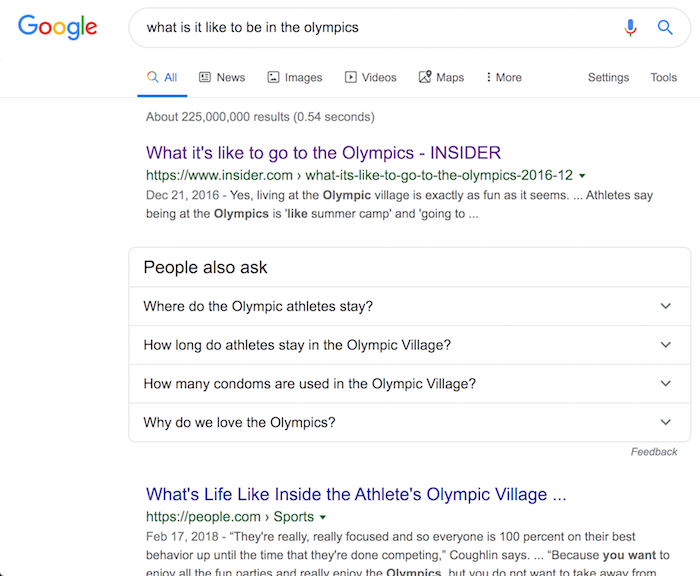
Although the first result has the title of “What it’s like
to go to the Olympics”, the article doesn’t break down what it is like to go as
an attendee, it breaks down what it is like to go as an athlete. Just like a
searcher would expect based on the query.
Bert was clearly able to figure this out even though the title could have gone either way. And the article itself isn’t that long. The article itself only has 311 words.
If you want to do well when it comes to ranking for informational keywords, go very specific and answer the question better than your competitors. From videos and images to audio, do whatever needs to be done to create a better experience.
Now to be clear, this doesn’t mean that long-form content doesn’t work. It’s just that every SEO already focuses on long-form content. They are going after generic head terms that can be interpreted in 100 different ways and that’s why the content may be long and thorough.
In other words, focus more on long-tail terms.
You may think that is obvious but let’s look at the data.
It all starts with Ubersuggest. If you haven’t used it yet, you can type in a keyword like “marketing” and it will show you the search volume as well as give you thousands (if not millions) of keyword variations.
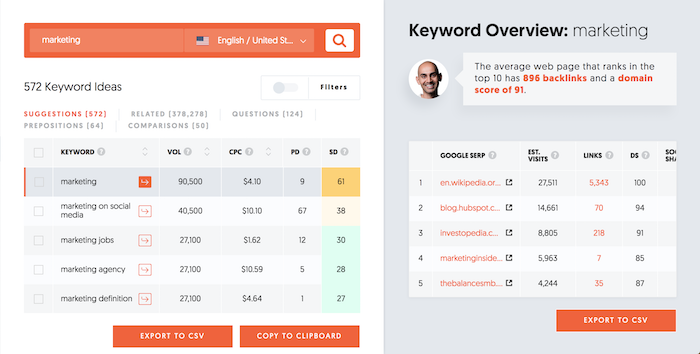
In the last 30 days, 4,721,534 keyword queries were performed on Ubersuggest by 694,284 marketers. Those 4,721,534 searches returned 1,674,841,398 keyword recommendations.
And sure, SEOs could be typing in head terms to find more long-tail phrases, but when we look at what keywords people are selecting within Ubersuggest and exporting, 84% of marketers are focusing on 1 or 2-word search terms.
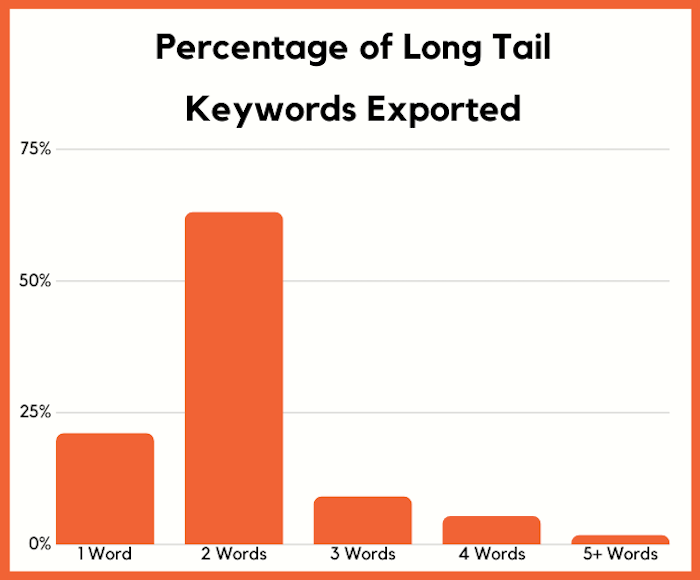
Only 1.7% of marketers are focusing on search terms that are
5 or words longer.
Following the strategy of creating content around very specific long-tail phrases is so effective that sites like Quora are generating 60,428,999 visitors a month just from Google alone in the United States.

And a lot of their content isn’t super detailed with 10,000-word
responses. They just focus on answering very specific questions that people
have.
Conclusion
Even if your search traffic drops a bit from the latest
update, it’s a good thing.
I know that sounds crazy, but think of it this way… if
someone searched for “how to lose weight without diet pills” and they landed on
your article about how diet pills are amazing, they are just going to hit the
back button and go back to Google.
In other words, it is unlikely that the traffic converted into a conversion.
Sure, you may lose some traffic from this update, but the
traffic was ruining your user metrics and increasing your bounce rate.
Plus, this is your opportunity to create content that is super-specific. If you lose traffic, look at the pages that dropped, the search queries that you aren’t ranking for anymore, and go and adjust your content or create new content that answers the questions people are looking for.
If you don’t know how to do this, just log into Search Console, click on
“search results”, and click on the date button.

Then click on compare and select the dates where your
traffic dropped and compare it to the previous periods. Then select “Queries”
and sort by the biggest difference.
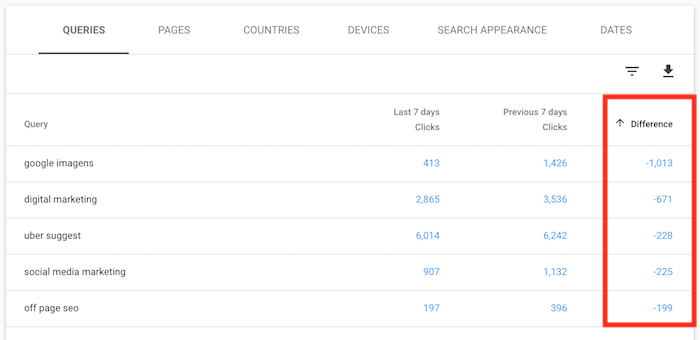
You’ll have to dig for the longer-term search queries as those are the easiest to fix. And if you are unsure about what to fix, just search for the terms on Google that dropped and look at the top-ranking competitors. Compare their page with yours as it will provide some insights.
So, what do you think about the latest update?
